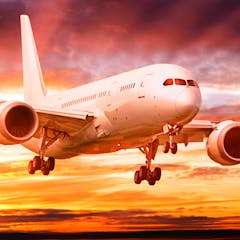
Articles on Boeing 737 Max
Displaying all articles

Boeing is under increased public and government scrutiny in the wake of dangerous events that have people worried about the safety of air travel.

A commercial pilot turned management expert and author of ‘The Next Crash: How Short-Term Profit Seeking Trumps Airline Safety,’ explains the economics behind the near-deadly disaster.

Companies like Facebook, Volkswagen, Boeing – and now the Post Office – have seen how easy it is to destroy brand trust. But communication and transparency are key to rebuilding efforts.

Industry has renewed confidence after Boeing made commitments to redesign aircraft and train pilots

Disasters highlight the cost of society’s love of efficiency. Nature, in contrast, favors resilience. Being more like nature offers benefits for society, especially in the face of the climate crisis.

Almost two years after crashing twice within five months and being pulled out of service, the Boeing 737 Max’s return to the skies has now been approved.

The Boeing 737 MAX, which has been grounded since 2019 following two fatal crashes, is expected to be cleared to fly again. An aviation law expert proposes a way to improve the certification process.

High-profile rail and aerospace disasters of recent years have been the deadly consequence of the systematic erosion of safety precautions due to deregulation.

With planes grounded, and money lost, the firm is at a pivotal point in its history.

If Airbus has once again become the world’s leading aircraft manufacturer, it is mainly thanks to a favorable economic context and Boeing’s 737 Max crisis.

The Boeing MAX disaster has already cost the company billions of dollars and will have ripple effects on suppliers and the wider US economy, with tens of thousands of jobs at risk.

Qantas has faced calls to ground its entire fleet of Boeing 737s after cracks were found in three aircraft. But the incident is a threat to airlines’ reputations rather than a real risk to passengers.

Government regulators and industry experts often overlook the complexities and risks of human-technology interactions and increasingly rely on companies’ voluntary oversight and self-assessments.

A pilot and researcher knows that airplanes are full of sensors – and finds a way onboard computers can use the data to detect equipment failure and tell pilots what’s a real emergency and what’s not.

With all Boeing 737 MAX planes now grounded, airlines could be losing close to US$60m a day.

A human-centred approach to machine design can help make machines safer and more efficient.

Boeing’s response to the crisis over its 737 Max planes has made the company seem defensive and passive. A crisis management expert explains how Boeing could reclaim the narrative.

The Boeing 737 is the most produced commercial aeroplane in history – so what might have gone wrong?

The inquiries can take months of painstaking work, but often yield important insights that improve flight safety for everyone long into the future.

An analysis of flight data shows that problems began at a point when the pilot would normally have engaged the autopilot system.
